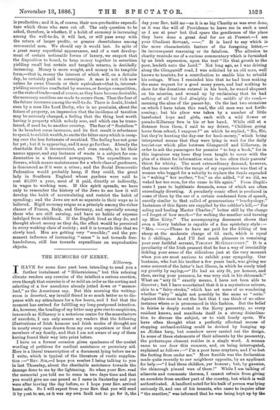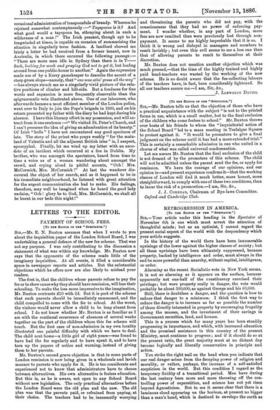THE H1TAIOURS OF KERRY, Killarney.
IHA.VE for some time past been intending to send you a further instalment of " Hibernicisms," but this relaxing climate renders any exercise of the intellect a serious exertion, even though that exercise is of so mild an order as the sorting and selecting of a few anecdotes already jotted down or "memor- ised," as the Americans say. But this morning the writing- room is deserted, my invalid friend is so much better as to dis- pense with my attendance for a few hours, and I feel that the moment has arrived for fulfilling my long-postponed intention. As, however, the heading of my letter may give rise to suspicions, inasmuch as Killarney is a notorious centre for the manufacture of anecdote, I can only assure my readers that the following illustrations of Irish humour and Irish modes of thought are in nearly every case drawn from my own experience or that of members of my family, and that I am not aware of any of them having found their way into print before.
I have on a former occasion given specimens of the quaint wording of petitions for medical assistance or pecuniary aid. Here is a literal transcription of a document lying before me as I write, which is typical of the literature of rustic supplica- tion :—" REV. Sre,—I hope you .rember I being talking to you in last Thuresday, about the °heritable assistance towards the damage done to me by the lightening. So when your Rev, read the memorial you told me to come in two days time and that you would give me one pound so I came in Santarday and you were after leaving the day before, so I hope your Rev, arrived home safe. So I will expect from your Bev, that you will send it by rost to me, as it was my own fault not to go for it, the
day your Rev, told me—as it is as big Charity as was ever done, as it was the will of Providence to leave me in such a need as I am at proof but God spare the gentlemen of the place they have done a great deal for me at Present.—I am your Obedient Servant, —." It is hard to say which is the more characteristic feature of the foregoing letter,— its inconsequent reasoning or its fatalism. The allusion to charity reminds me of a curious commentary which is furnished by an Irish expression, upon the tart "He that giveth to the poor, lendeth unto the Lord." Not long ago, as I was driving along the Glengarriff road, I was solicited by an old man, well known to tourists, for a contribution to enable hint to rebuild his cottage. When I reminded him that he had been making the same request for a good many years, and had nothing to show for the donations entered in his book, he waxed eloquent on his miseries, and wound up by exclaiming that he had nothing at all but God Almighty in the middle of the road,— meaning the alms of the passer-by. On the last two occasions on which I have taken this road, the old man was not forth- coming ; but his place was taken by a number of little barefooted boys and girls, each with a wild flower or pseudo-Killarney fern in his or her hand. While still at a distance from them, I said to my driver, "Children going home from school, I suppose P" on which he replied, "No, Sir, but they're hunting the day-oar for book-money," which being interpreted means that they were lying in wait for the daily tourist-car which plies between Glengarriff and Killarney, in order to ask the passengers for pennies "to buy a book," for in this ingenious way have they been taught to cover with the plea of a thirst for information what is too often their parents' thirst for whisky. The most extraordinary demand, however, that has come within the range of my experience was that of a woman who begged for a subsidy to replace the funds expended in " waking " her mother, "for," as she added, "if we did, we waked her too soon, for she came to life again." From illegiti- mate I pass to legitimate demands, some of which are often exceedingly diverting. A peculiarly comic effect is produced in some of them by the use of a certain condensed form of speech, exactly similar to that called of grammarians " brachyology." Instances of this figure are supplied by the cobbler's bill,—" For soling and heeling Master Charles ;" better still by the charge —I forget of how much—" for welting the masther and turning up Miss Kitty."• The accompanying document shows that even a Kerry hatcher is capable of a fine epistolary style :— " Mrs. —,—Please to have me paid for the killing of ten sheep at the moderate charge of 6d. each, which is equal to 5 shillings. And I'll feel much pleasure in remaining your ever faithful servant, Timorur MCGILLYCITDDY." It is a peculiarity of the Irish peasant that he has a way of irresistibly tickling your sense of the ridiculous just at the very moment when you are most anxious to exhibit your sympathy. Our boatman, who lost his brother a few years back, was giving me some account of the latter's last illness, in which he sorely tried my gravity by saying,—" He had an airy fit, yer honour, and then, saving your presence, he was very sick in his ahtomaoh." What an "airy fit" exactly means, I have not been able to discover ; but I have ascertained that it is a mysterious seizure, akin to a "fairy-stroke," which has set some of us wondering whether " airy " might not possibly be the same as "eerie." Against this must be set the fact that I can think of no other instance where ee is pronounced in this fashion. But the belief in fairies is deeply rooted in the Kerry peasantry, as every resident knows, and manifests itself in a strong disinclina- tion to discuss the subject, or to visit lonely spots. We have often thought what a perfectly effectual meatus of stopping orchard-robbing could be devised by hanging up an Aolian harp, but somehow never carried out the design. In some of these statements of their ailments by the peasantry, the picturesque element resides in a single word. A woman came to our door this summer, and, on being interrogated, explained as follows :—" I'm a poor lame crayture, and I've lost the footing from under me." More forcible was the declaration made quite recently to our neighbour opposite, by an applicant for help :—" I had three childher, yer honour ; bat, by patties, the ohincough pinned wan of them l" While I ant talking of ailments and comments thereon, I cannot refrain front giving an anecdote from another part of the country, but which is well authenticated. A landlord noted for his bulk of person was lying seriously ill, and one of his tenants, who came to inquire after "the masther," was informed that he was being kept up by the occasional administration of teaspoonfuls of brandy. Whereon he rejoined somewhat contemptuously :—" Tayspoons is it P And what good would a tayspoon be, sthraying about in such a wilderness of a man !" The Irish peasant, though apt to be longwinded at times, is capable on occasion of summarising the situation in singularly terse fashion. A landlord showed me lately a letter he had received from a former tenant, now in Australia, in which there occurred the following passage:— "There are more men idle in Sydney than there is in T— flock, looking for work and praying God not to get it, but loafing around from one public-house to another." Again the expression made use of by a Kerry gamekeeper to describe the ascent of a steep green slope—namely, that" one was atin' grass all the way" —has always struck me as a singularly vivid picture of the rela- tive positions of climber and hill-side. But a fondness for fine words and expansion is more frequently observable than the epigrammatic vein illustrated above. One of our labourers, who afterwards became a most efficient member of the London police, went over to Italy to join the Pope's brigade in 1860, and on his return presented my father with the diary he had kept during his absence. I have this literary effort in my possession, and will ex- tract from it one sentence :—" We visited St. Peter's Church, and I can't presume the idea of giving an adumbration of its beauty." Of Irish " bulls " I have not encountered any good specimen of late. The story of the priest who prays weekly "for the main- land of Valentia and all the adjacent British isles" is, I suspect, apocryphal. Finally, let me wind up my letter with an anec- dote of an incident which occurred at a fire in Dublin. My brother, who was amongst the spectators, beard from time to time a voice as of a woman wandering about amongst the crowd, and crying aloud in pitiful accents, " Och ! Mrs. McCormick, Mrs. McCormick !" At last the wanderer dis- covered the object of her search, and as it happened to be in his immediate neighbourhood, he listened with great attention for the urgent communication she had to make. His feelings, therefore, may well be imagined when he heard the good lady exclaim, " Och ! glory be to God, Mrs. McCormick, we shall all be burnt in our beds this night !"



































 Previous page
Previous page